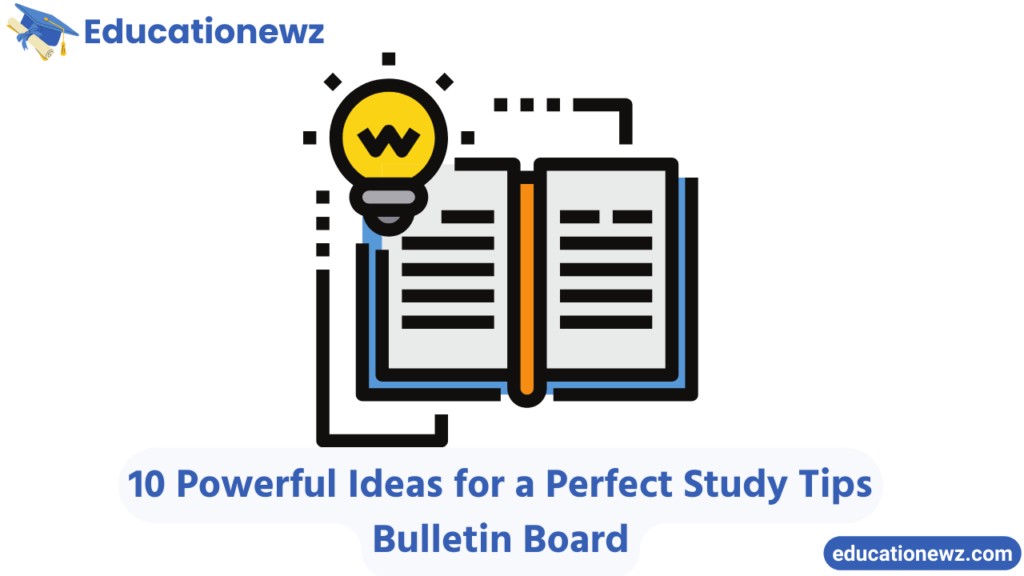These 10 Secret Study Tips will help you maximize efficiency, reduce stress, and boost retention, leading to improved academic performance without the burnout.
Studying efficiently is the key to achieving academic success without burning out. Many students focus on studying longer hours, but what truly sets high-achievers apart is their ability to study smart, not hard. “Study Smart, Not Hard” is the philosophy that allows top students to excel with less effort while maximizing results. In this article, we’ll explore 10 secret study tips that the highest-ranking students use to stay ahead of the curve.
By following these tips, you’ll learn how to optimize your study routine, boost concentration, and manage your time effectively. Whether you’re preparing for exams or working through daily assignments, these secret study tips will guide you toward better academic performance with less stress. Keep reading to uncover the strategies that can change your study game forever!
Why Study Tips Are Essential for Every Student’s Success
Study tips are essential for students aiming to study smarter and achieve better results with less stress. Instead of spending endless hours with textbooks, top students use proven strategies that help them learn efficiently and retain information.
1. Maximize Efficiency
Top students engage actively with their material, using strategies like summarizing, teaching others, and creating mind maps. These active learning techniques increase retention and help cover more in less time.
2. Reduce Stress
Being organized is key to reducing stress. A clear study plan helps break down large tasks, making the workload feel manageable and easing anxiety, especially during exams.
3. Boost Retention
Instead of cramming, successful students regularly review their notes using spaced repetition, ensuring information stays fresh and accessible for exams.
4. Time Management
Techniques like the Pomodoro Method—short study bursts followed by breaks—help students stay focused and avoid burnout, making every minute count.
5. Build Confidence
Seeing progress boosts confidence. When students follow a structured study plan, they feel more in control, reducing exam anxiety and boosting motivation.
Study tips make learning more effective, less stressful, and ultimately lead to better results. By studying smarter, students can achieve more with less effort.
10 Secret Study Tips From the Topper’s Playbook
1. Prioritize Your Tasks: The Power of a To-Do List

Organizing your tasks is crucial to studying smart. It may sound basic, but making a to-do list is one of the most effective ways to stay on track. High-achieving students always start their day by listing the tasks they need to accomplish. This strategy helps them focus on important subjects first, leaving less demanding tasks for later. A well-structured list prevents you from getting overwhelmed by a mountain of work.
When creating a to-do list, make sure to break down large tasks into smaller, manageable ones. This technique helps you avoid procrastination and improves motivation. Additionally, by crossing off completed tasks, you’ll get a sense of accomplishment, further motivating you to continue.
How to prioritize effectively:
- Identify deadlines and put urgent tasks at the top.
- Break tasks into smaller, manageable segments.
- Allocate time for review and rest.
| Task Name | Urgency Level | Time Estimate | Status |
|---|---|---|---|
| Math Chapter 5 | High | 2 hours | Pending |
| History Review | Medium | 1 hour | Completed |
| Chemistry Lab Work | Low | 45 minutes | Pending |
By following this simple yet powerful system, you can study smarter and ensure nothing gets missed.
2. Active Recall: The Key to Retention
One of the most popular and effective study techniques is active recall. This method involves testing yourself on the material you’ve just studied rather than passively reading your notes. Instead of just rereading a chapter or summary, ask yourself questions about the content, and try to answer them without looking at your books.
Active recall forces your brain to engage with the material on a deeper level, enhancing memory retention. Research has shown that actively retrieving information from memory strengthens neural connections, making it easier to recall when needed.
How to apply active recall:
- Use flashcards with questions on one side and answers on the other.
- Write down key points from your readings and quiz yourself later.
- Regularly review material at spaced intervals.
Active recall improves both long-term memory and exam performance, making it one of the top secret study tips for top students.
3. Spaced Repetition: Reinforce Learning Over Time
Spaced repetition is a time-tested study strategy that involves revisiting the material at increasing intervals. Instead of cramming everything in one sitting, review the material multiple times over days or weeks. Research shows that spaced repetition enhances long-term retention more effectively than massed practice (i.e., cramming).
There are many apps, such as Anki, that use spaced repetition algorithms to help you remember information efficiently. The idea is simple: review difficult material more frequently than easier material. By spacing out your study sessions, your brain gets the opportunity to better absorb and retain the information for future use.
Steps to implement spaced repetition:
- Start with new concepts and review them the next day.
- Increase the time between review sessions as you become more confident in the material.
- Use study apps or manually schedule your reviews.
Spaced repetition can be a game-changer in your ability to remember and apply knowledge in exams.
4. The Pomodoro Technique: Work in Intervals for Maximum Focus
Time management is one of the core components of smart studying, and the Pomodoro Technique is a powerful tool for enhancing concentration. The Pomodoro Technique involves working in short, focused intervals of 25 minutes, followed by a 5-minute break. After completing four intervals, take a longer break of 15-30 minutes.
This method prevents burnout and ensures that you stay productive throughout the day. By focusing your attention for a short burst of time, your brain stays engaged, and you’re less likely to get distracted.
Benefits of the Pomodoro Technique:
- Increased productivity due to regular breaks.
- Helps avoid mental fatigue and improves focus.
- Prevents distractions by setting time limits for tasks.
This technique can significantly improve your focus and help you study smarter, not harder.
5. Avoid Multitasking: Focus on One Task at a Time

While multitasking may seem efficient, it actually lowers your overall productivity. Research shows that the brain isn’t designed to focus on multiple tasks at once, which can result in mistakes and incomplete work. Top students understand the importance of single-tasking, dedicating their attention to one thing at a time.
By focusing solely on the task at hand, you will complete it more efficiently and retain more information. Multitasking can also cause unnecessary mental fatigue, which can make it harder to stay motivated in the long run.
How to stay focused:
- Turn off notifications and avoid switching apps.
- Set specific goals for each study session.
- Take breaks between tasks to stay mentally refreshed.
Focusing on one task at a time is a secret study tip that can dramatically improve your productivity.
6. Use Mind Maps: Visualize Information for Better Understanding
Mind mapping is an excellent technique for organizing complex information. By creating visual diagrams, you can link concepts together and see the bigger picture. This method is particularly useful for subjects that require understanding relationships between ideas or processes, such as biology or history.
Creating a mind map helps you organize your thoughts and ensures you don’t overlook key connections. The process of creating a mind map itself also reinforces the material in your memory.
Steps for creating effective mind maps:
- Start with a central concept in the middle of the page.
- Draw branches for related ideas, using keywords or short phrases.
- Expand on each branch with additional details.
Mind maps are one of the secret study tips that help students simplify complex topics and retain information efficiently.
7. Take Care of Your Body: The Link Between Physical Health and Mental Performance
Smart studying isn’t just about mental strategies; physical health plays a critical role in academic success. High-achieving students understand the importance of nutrition, exercise, and adequate sleep. Without a healthy body, your mind can’t perform at its best.
Exercise boosts blood flow to the brain, improving focus and cognitive function. A healthy diet rich in vitamins and minerals supports brain health. Additionally, getting 7-9 hours of sleep each night allows your brain to consolidate memories and repair itself.
Tips for improving physical health:
- Eat a balanced diet with plenty of fruits, vegetables, and proteins.
- Stay active by exercising regularly.
- Prioritize sleep and aim for 7-9 hours per night.
By improving your physical health, you’ll be able to study smarter and achieve better results.
8. Eliminate Distractions: Create a Study-Friendly Environment
Creating a distraction-free environment is crucial to staying focused. High-achieving students always ensure their study space is organized and free from potential distractions. Whether it’s social media, noisy environments, or messy desks, distractions can severely affect your concentration.
Create a study-friendly space where you can focus and stay productive for long periods. Keep your phone on silent mode or in another room. Clear away unnecessary clutter from your desk, and make sure your lighting is adequate for reading.
How to minimize distractions:
- Set up a dedicated study area away from distractions.
- Use apps like Forest to block distracting websites.
- Keep your study materials organized and within reach.
An organized, distraction-free environment is key to studying smarter, not harder.
9. Practice Time Management: Learn to Study in Chunks
Effective time management is essential for balancing schoolwork with personal activities. Top students practice time-blocking, where they assign specific time slots for each subject or task. This ensures that no subject is neglected, and everything gets completed within the allocated time.
Using a calendar or a digital planner can help you track deadlines and plan your study sessions in advance. Time-blocking prevents over-studying a single subject and helps distribute your energy evenly across all subjects.
How to use time management for smart studying:
- Break your study sessions into chunks.
- Use a digital calendar or planner for organizing tasks.
- Review tasks daily to ensure you’re on track.
Mastering time management will make studying more efficient and give you more free time.
10. Stay Positive and Believe in Yourself

One of the most powerful secrets to academic success is confidence. Top students maintain a positive mindset, believing that they can overcome challenges. A positive attitude helps reduce stress and boosts motivation. Even when faced with difficult topics, believing that you will succeed keeps you on track.
Ways to maintain positivity:
- Affirmations: Practice self-encouragement.
- Visualize success: Imagine yourself acing exams.
- Stay around people who are motivating and supportive.
A positive mindset is one of the biggest secret study tips that can lead you to success.
FAQs
1. What is the best study tip for retaining information?
- Active recall and spaced repetition are the most effective techniques for long-term retention.
2. How do I stay focused during long study sessions?
- Use the Pomodoro technique to break your study time into manageable intervals and take breaks.
3. How often should I review my notes?
- Review your notes every day initially, then use spaced repetition to review at increasing intervals.
4. Can multitasking help me study more effectively?
- No, multitasking decreases focus and productivity. Focus on one task at a time.
5. How important is sleep for studying smart?
- Sleep is crucial for memory consolidation and overall brain function. Aim for 7-9 hours of quality sleep.
Conclusion
By following these 10 Secret Study Tips, you’ll supercharge your learning, boost productivity, and reach your academic goals faster than ever. It’s not about working harder, but working smarter. Implement these strategies into your routine now, and you’ll see an immediate difference in your focus, efficiency, and overall performance. Don’t just study—study the right way and watch your success skyrocket! Please follow our blog Educationewz.



